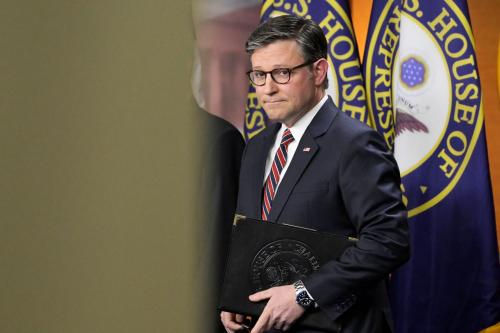This piece originally appeared in The Washington Post.
“The Republican Party has become an insurgent outlier—ideologically extreme; contemptuous of the inherited social and economic regime; scornful of compromise; unpersuaded by conventional understanding of facts, evidence and science; and dismissive of the legitimacy of its political opposition.” That passage, which framed a core part of the argument of our 2012 book, It’s Even Worse Than It Looks, was vilified by conservative commentators, called a rant and a parody.
Fast forward to 2016. Incredibly, Republican destructiveness is even worse than it was four years ago—and the party is paying for it with a surge of anti-establishment populism that is tearing apart its coalitional base.
Parts of our 2012 diagnosis were widely recognized and supported by scholarly research. As our political parties became more ideologically distinct and competitively balanced in their electoral struggle to control the White House and Congress, they took on the characteristics of their parliamentary counterparts: internally unified and fiercely oppositional. But parliamentary-like parties in a presidential or separation-of-powers system—one prone to divided government and clashing mandates—are a formula for willful obstruction and policy irresolution.
The American constitutional system has been vulnerable to this mismatch since its beginning. Polarized parties are bound to strain the constitutional system, as they did in the years leading up to the Civil War and at the end of the 19th Century during the Gilded Age. This era differs, however, because the parties have tribalized in a distinctly asymmetric way.
It is the radicalization of the Republican party—not just in terms of ideology but also in an utter rejection of the norms and civic culture underlying our constitutional system—that has been the most significant and consequential change in American politics in recent decades. Tribal politics fueled by partisan and social media leaves us with a good vs. evil view of democracy and a visceral hatred of the opposition party.
There is another factor that is less ideological and more strategic: the phenomenon of the permanent campaign in a competitive environment. Republicans in Congress—from the day of President Obama’s inauguration in 2009—pursued a strategy of unified opposition to every Obama policy and initiative, including those they had recently supported, such as investment in infrastructure, health care reform and climate change. They also worked with their counterparts in cable television and talk radio to demonize every victory and to delegitimize the president.
The strategy worked to give Republicans smashing victories in midterm contests in 2010 and 2014. Senate Republican Leader Mitch McConnell said of the key Obama initiatives after the 2010 victory, “We worked very hard to keep our fingerprints off of these proposals … Because we thought—correctly, I think—that the only way the American people would know that a great debate was going on was if the measures were not bipartisan. When you hang the ‘bipartisan’ tag on something, the perception is that differences have been worked out, and there’s a broad agreement that that’s the way forward.” But the price was reaffirming for a public already wary of politicians that leaders in Washington are not capable of solving problems for most Americans.
Today, incredibly, it’s even worse than it was. Continuing to fan the flames of hatred of Obama, Republican leaders openly acknowledged that little if anything of consequence would be considered by Congress during the last year of President Obama’s term, then trashed long-standing precedents by refusing to schedule the traditional hearings at which the Administration presents its budget or to even consider any presidential nominee to fill the Supreme Court vacancy.
The spectacle of a political system with politicians unable to work together—thanks to McConnell and his House counterparts—contributed to a populist, anti-establishment wave, a contempt for the status quo that hit both parties but with far more resonance among Republicans. For the entirety of this year’s presidential campaign, anti-establishment, outsider candidates have garnered between 60 and 70 percent support among Republican voters. Donald Trump, America’s equivalent of European right-wing populists and possibly the most miscast presidential front-runner for a major party in American history, makes a mockery of the Republican establishment agenda and presages the GOP’s possible break-up. It is a self-inflicted wound, but one with disastrous consequences for us all.
The most promising route to a healthier democracy and less dysfunctional government almost certainly runs through the electoral process. Yet democratic accountability is not easily achieved during a period of polarized parties, divided government and hotly contested national races on an ever-diminishing competitive terrain, especially when that process is rigged to prevent decisive outcomes. The Trump disaster, especially if it leads to a Democratic sweep of the 2016 elections, may provide the basis for a major rethinking and realignment of a deeply dysfunctional Republican Party.
Then again, it may not.
The Brookings Institution is committed to quality, independence, and impact.
We are supported by a diverse array of funders. In line with our values and policies, each Brookings publication represents the sole views of its author(s).




Commentary
Republicans created dysfunction. Now they’re paying for it.
March 8, 2016